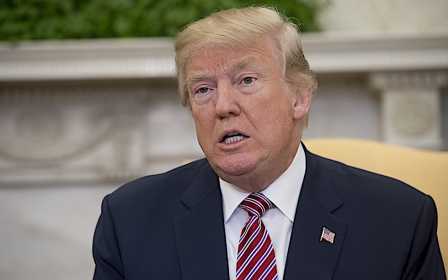US denies discussing Israeli settlements annexation with Netanyahu

The US denied claims by an Israeli spokesman on Monday that Washington had been discussing legislation with the Israeli premier that would effectively annex settlements in the occupied West Bank.
In a rare rebuke, the White House denied having such discussions and a senior Israeli official said Benjamin Netanyahu had not made a specific annexation proposal to Washington.
"Reports that the United States discussed with Israel an annexation plan for the West Bank are false," White House spokesman Josh Raffel said. "The United States and Israel have never discussed such a proposal, and the president’s focus remains squarely on his Israeli-Palestinian peace initiative."
The move would severely harm remaining prospects for a two-state solution to the Israeli-Palestinian conflict and draw international outrage.
"Regarding the issue of applying sovereignty, I can tell you that I have for some time been speaking with the Americans about it," Netanyahu told lawmakers from his Likud party, according to comments relayed by a spokesman.
Later on Monday, the prime minister’s office stepped back from any suggestion of a dialogue with Washington on any government annexation plan. It said Netanyahu had only updated the Americans on proposed legislation in parliament.
The comments come as Netanyahu is under pressure from right-wing politicians to move ahead with legislation that would apply Israeli sovereignty to settlements in the West Bank.
Two lawmakers, including one from Netanyahu's party, have proposed such legislation.
Netanyahu blocked it from being advanced on Sunday, with officials citing the need to focus on security issues following a confrontation that led to Israeli air strikes in Syria this past weekend. However, he did not veto the proposed legislation and it remains on the table for debate.
Unilateral annexation of settlements would be sure to draw international outrage, though Netanyahu's government has been bolstered by the unstinting support of US President Donald Trump.
Trump recognised Jerusalem as Israel's capital in December in a move praised by Netanyahu as "historic," but denounced by the Palestinians and most of the rest of the world.
While Israel would expect to retain certain settlements in any two-state peace deal, longstanding international consensus has been that their status must be negotiated.
The same consensus has been in place for decades regarding the status of Jerusalem, with the Palestinians wanting the eastern sector of the city as the capital of their future state.
Israeli settlements are located in what is known as Area C of the West Bank, which accounts for more than 60 percent of the Palestinian territory.
Annexing all settlements would leave little space for a Palestinian state.
Some commentators suggested Netanyahu's remarks to Likud might have been a move to placate right-wingers in his cabinet rather than a concrete plan.
Stay informed with MEE's newsletters
Sign up to get the latest alerts, insights and analysis, starting with Turkey Unpacked
Middle East Eye delivers independent and unrivalled coverage and analysis of the Middle East, North Africa and beyond. To learn more about republishing this content and the associated fees, please fill out this form. More about MEE can be found here.




